
Robert Bernard Altman was an American film director, screenwriter, and producer. He was a five-time nominee of the Academy Award for Best Director and is considered an enduring figure from the New Hollywood era. His most famous directorial achievements include M*A*S*H (1970), McCabe & Mrs. Miller (1971), The Long Goodbye (1973), Nashville (1975), 3 Women (1977), The Player (1992), Short Cuts (1993), and Gosford Park (2001).

Nicole Françoise Florence Dreyfus, known professionally as Anouk Aimée or Anouk, is a French film actress who has appeared in 70 films since 1947, having begun her film career at age 14. In her early years, she studied acting and dance besides her regular education. Although the majority of her films were French, she also made films in Spain, Great Britain, Italy and Germany, along with some American productions.
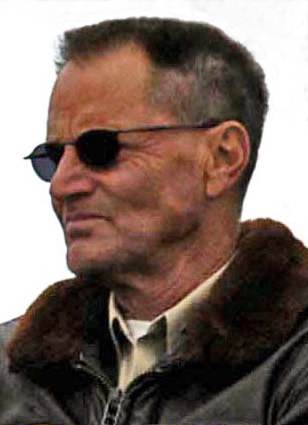
Samuel Shepard Rogers III was an American actor, playwright, author, director and screenwriter whose career spanned half a century. He won 10 Obie Awards for writing and directing, the most by any writer or director. He wrote 58 plays as well as several books of short stories, essays, and memoirs. Shepard received the Pulitzer Prize for Drama in 1979 for his play Buried Child and was nominated for an Academy Award for Best Supporting Actor for his portrayal of pilot Chuck Yeager in the 1983 film The Right Stuff. He received the PEN/Laura Pels Theater Award as a master American dramatist in 2009. New York magazine described Shepard as "the greatest American playwright of his generation."

Kimila Ann Basinger is an American actress. She has garnered acclaim for her work in film, for which she has received various accolades including an Academy Award, a Golden Globe Award, a Screen Actors Guild Award, and a star on the Hollywood Walk of Fame. Initially a TV starlet, she shot to fame as a Bond girl in 1983 and enjoyed a long heyday over the next two decades. In 2011 Los Angeles Times Magazine ranked her third on the "50 Most Beautiful Women In Film".

Paris, Texas is a 1984 drama road film directed by Wim Wenders, co-written by Sam Shepard and L. M. Kit Carson, and produced by Don Guest. It stars Harry Dean Stanton, Nastassja Kinski, Dean Stockwell, Aurore Clément, and Hunter Carson. In the film, disheveled recluse Travis Henderson (Stanton) reunites with his brother Walt (Stockwell) and son Hunter (Carson). Travis and Hunter embark on a trip through the American Southwest to track down Travis's missing wife, Jane (Kinski).

The Delinquents is a 1957 American drama film written, produced, and directed by Robert Altman. As the directorial debut of Altman, he filmed it in his hometown of Kansas City, Missouri during the summer of 1956 on a $63,000 budget. It is not only the first film Altman directed, but also the first to star Tom Laughlin.

9½ Weeks is a 1986 American erotic romantic drama film directed by Adrian Lyne, and starring Kim Basinger and Mickey Rourke. Basinger portrays a New York City art gallery employee who has a brief yet intense affair with a mysterious Wall Street broker, played by Rourke. The screenplay by Sarah Kernochan, Zalman King and Patricia Louisianna Knop is adapted from the 1978 memoir of the same name by Austrian-American author Ingeborg Day, under the pseudonym "Elizabeth McNeill".

The Getaway is a 1994 American action thriller film directed by Roger Donaldson. The screenplay was written by Walter Hill and Amy Holden Jones, based on Jim Thompson's 1958 novel of the same name. The film stars Alec Baldwin, Kim Basinger, Michael Madsen, James Woods and Jennifer Tilly.

3 Women is a 1977 American psychological drama film written, produced and directed by Robert Altman and starring Shelley Duvall, Sissy Spacek and Janice Rule. Set in a dusty California desert town, it depicts the increasingly bizarre relationship between a woman (Duvall), her roommate and co-worker (Spacek) and an older pregnant woman (Rule).
Fool for Love may refer to:

David George Arkin was an American actor, known for his numerous supporting appearances in the films of Robert Altman. These roles were part of Altman's frequent ensemble and included Staff Sergeant Vollmer in M*A*S*H, Harry in The Long Goodbye (1973), Norman in Nashville (1975), and The Mailman/The Police Officer in Popeye (1980).
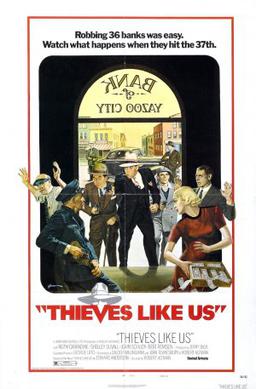
Thieves Like Us is a 1974 American crime film, set in the United States of the 1930s. It was directed by Robert Altman and starred Keith Carradine and Shelley Duvall. The film was based on the novel of the same name by Edward Anderson, which also supplied source material for the 1948 film They Live by Night, directed by Nicholas Ray. The Altman film sticks much closer to the book. The supporting cast includes Louise Fletcher and Tom Skerritt.
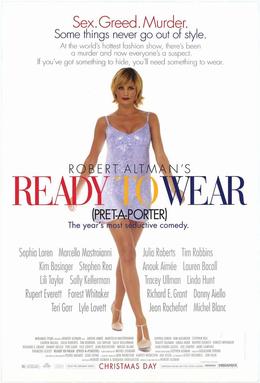
Prêt-à-Porter, released in the United States as Ready to Wear (Prêt-à-Porter), is a 1994 American satirical comedy-drama film co-written, directed, and produced by Robert Altman and shot on location during the Paris Fashion Week with a host of international stars, models, and designers.
Fool for Love is a play written by American playwright and actor Sam Shepard. The play focuses on May and Eddie, former lovers who have met again in a motel in the desert. The play premiered in 1983 at the Magic Theatre in San Francisco, where Shepard was the playwright-in-residence. The play was a finalist for the 1984 Pulitzer Prize for Drama.

Strange Interlude is an experimental play in nine acts by American playwright Eugene O'Neill. O'Neill began work on it as early as 1923 and developed its scenario in 1925; he wrote the play between May 1926 and the summer of 1927, and completed its text for publication in January 1928, during the final rehearsals for its premiere performance. Strange Interlude opened on Broadway on January 30, 1928, and won the Pulitzer Prize for Drama. Lynn Fontanne originated the central role of Nina Leeds on Broadway. It was also produced in London at the Lyric Theatre in 1931. It was included in Burns Mantle's The Best Plays of 1927-1928. Because of its length, around five hours if uncut, the play has sometimes been produced with a dinner break or on consecutive evenings. The play's themes – a woman's sexual affairs, mental illness, abortion, and deception over paternity – were very controversial for the 1920s. It was censored or banned in many cities outside New York.
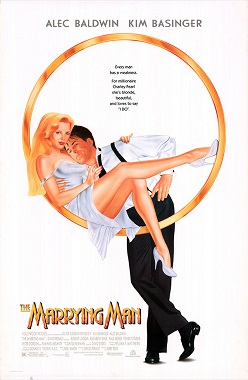
The Marrying Man is a 1991 American romantic comedy film, directed by Jerry Rees, written by Neil Simon, and starring Alec Baldwin and Kim Basinger.
J.A. Martin Photographer is a 1977 drama film directed by Jean Beaudin for the National Film Board of Canada.

The woman's film is a film genre which includes women-centered narratives, female protagonists and is designed to appeal to a female audience. Woman's films usually portray stereotypical women's concerns such as domestic life, family, motherhood, self-sacrifice, and romance. These films were produced from the silent era through the 1950s and early 1960s, but were most popular in the 1930s and 1940s, reaching their zenith during World War II. Although Hollywood continued to make films characterized by some of the elements of the traditional woman's film in the second half of the 20th century, the term itself disappeared in the 1960s. The work of directors George Cukor, Douglas Sirk, Max Ophüls, and Josef von Sternberg has been associated with the woman's film genre. Joan Crawford, Bette Davis, and Barbara Stanwyck were some of the genre's most prolific stars.
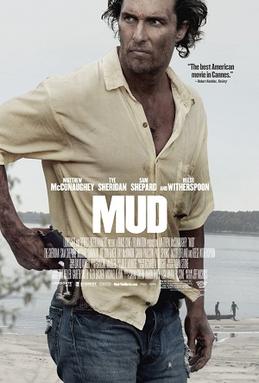
Mud is a 2012 American coming-of-age drama film written and directed by Jeff Nichols. In the film, Tye Sheridan and Jacob Lofland portray a pair of teenagers who encounter the eponymous Mud, a fugitive hiding on a small island, and agree to help him evade his pursuers. Sam Shepard and Reese Witherspoon also star.

Kim Basinger is an American actress who made her television debut as Sheila in "Night Train to Dallas", an episode of the action/adventure drama series Gemini Man that aired on NBC in 1976. She starred in two canceled series as well as several made-for-TV films, including a remake of From Here to Eternity (1979). Her feature film debut was in 1981 drama Hard Country. Basinger came to prominence playing Bond girl Domino Petachi in the 1983 film Never Say Never Again, opposite Sean Connery, and went on to receive a Golden Globe nomination for her role as Memo Paris in The Natural (1984). She also starred as Elizabeth in the controversial erotic romantic drama 9½ Weeks (1986) with Mickey Rourke, as the title character in Nadine with Jeff Bridges (1987) and as Vicki Vale in Tim Burton's blockbuster Batman (1989), which remains the highest-grossing film of her career.


















